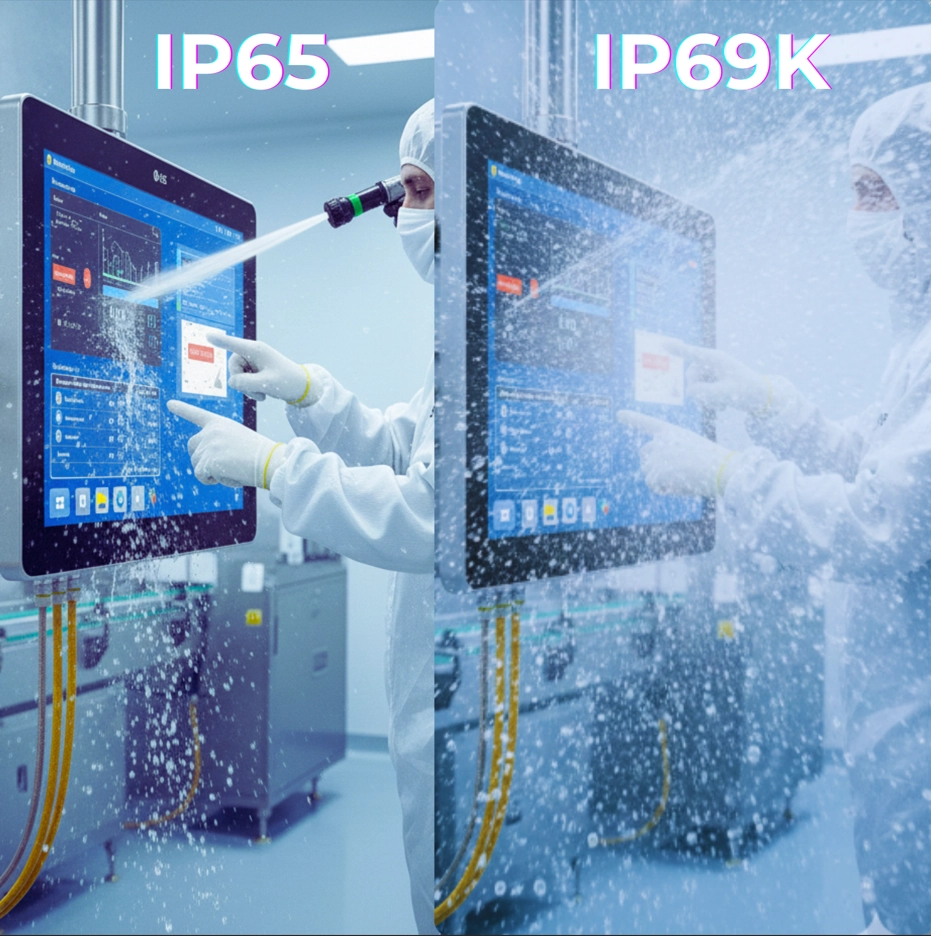Die Entwicklung von Industrie-PCs (IPCs) im Bereich Edge Computing spielt eine entscheidende Rolle in modernen Automatisierungsstrategien. Von Panel-PCs bis hin zu robusten Industriemonitoren bieten lüfterlose Industriecomputer leistungsstarke Rechenfunktionen für KI, Datenerfassung und Echtzeitbetrieb. In Verbindung mit führenden Plattformen wie Allen-Bradley FactoryTalk® View ermöglichen diese Lösungen der Industrie eine präzise Steuerung in rauen Umgebungen. Dieser Artikel beschreibt, wie Industriecomputer und Panel-PCs die nächste Generation der Industrieautomatisierung prägen und bietet praktische Einblicke für Ingenieure, die zuverlässige, skalierbare und leistungsstarke IPCs in anspruchsvolle Industrieumgebungen integrieren möchten.
Warum Industrie-PCs für Edge Computing in modernen Industrieumgebungen von entscheidender Bedeutung sind
Die Bedeutung von lüfterlosen Industrie-PCs in rauen Umgebungen
Edge Computing erfordert eine hohe Zuverlässigkeit in dezentralen Umgebungen, in denen Daten nahe an ihrer Quelle verarbeitet werden müssen. Industrie-PCs, insbesondere lüfterlose Modelle, sind in diesen Szenarien von entscheidender Bedeutung. Sie bieten dank ihres robusten Gehäuses, passiver Kühlsysteme und großer Betriebstemperaturbereiche eine hohe Widerstandsfähigkeit in extremen Umgebungen.
Lüfterlose Industrie-PCs sind häufig mit Intel® Celeron®-, Core™ i5- oder Core™ i7-Prozessoren ausgestattet und bieten eine Leistung, die für KI-gesteuerte Analysen, Echtzeitautomatisierung und Datenerfassung geeignet ist. Ihre Architektur kommt ohne bewegliche Teile aus, was das Ausfallrisiko in Umgebungen, die anfällig für Staub, Vibrationen und Temperaturschwankungen sind, reduziert und sie ideal für industrielle Rackmount-Konfigurationen macht. Gängige Montageoptionen, einschließlich DIN-Schiene, Rackmontage und Wandmontage, ermöglichen einen flexiblen Einsatz in engen oder gefährlichen Umgebungen.
Diese robusten Systeme sind ein wesentlicher Bestandteil der Fabrikautomatisierung, der Prozesssteuerung und der Transportinfrastruktur, wo ein Dauerbetrieb ohne aktive Kühlung nicht verhandelbar ist. Ihre Schnittstellenfähigkeit über Ethernet, USB, DisplayPort und serielle Anschlüsse gewährleistet eine nahtlose Integration mit älteren und modernen Geräten, einschließlich Touchscreen-Schnittstellen.
Erfahren Sie mehr über unser zuverlässiges RML-L67-NV Industrie-PCSie wurde für Stabilität und Flexibilität in Edge-Computing-Umgebungen entwickelt, insbesondere mit Intel Core-Prozessoren.
Top 10 Anwendungsszenarien für Edge Computing mit Industrie-PCs
Wie Panel-PCs und Industriemonitore die Fabrikautomation unterstützen
Panel-PCs und Industriemonitore sind zu einem integralen Bestandteil des Edge Computing in der industriellen Automatisierung geworden. Diese Systeme bilden die Schnittstelle zwischen Maschinenbedienern und komplexen Steuerungsumgebungen und ermöglichen die Echtzeitüberwachung über Touchscreens und HMI-Anwendungen, die sich ideal für die IoT-Integration eignen.
Zu den wichtigsten Anwendungen gehören vorausschauende Wartung, maschinelles Sehen, SCADA-Systeme und Qualitätskontrolle in Echtzeit. Industrie-Panel-PCs mit lüfterlosem Design und robusten Gehäusen gewährleisten Betriebszuverlässigkeit in rauen und anspruchsvollen Umgebungen. Ihre Integration in Automatisierungsplattformen ermöglicht eine intuitive Steuerung und sorgt für optimierte Arbeitsabläufe und mehr Sicherheit.
Konnektivität ist nach wie vor unerlässlich. Ethernet-Anschlüsse, USB 3.0, serielle Anschlüsse und Wi-Fi-Funktionen sorgen dafür, dass diese Systeme an eine Vielzahl von industriellen Netzwerken, älteren Geräten und IoT-Geräten angepasst werden können.
Tabelle: Industrielle Anwendung vs. empfohlene IPC-Konfiguration
| Anmeldung | Empfohlener IPC-Formfaktor | Wesentliche Merkmale |
|---|---|---|
| Herstellung | Panel PC / HMI | Touchscreen, Ethernet |
| Energie | Box PC / Lüfterlos | Breite Temperatur, DIN-Schiene |
| Transport | Rackmount / Panel PC | Stoßsicher, SSD |
| Versorgungsunternehmen | Panel PC / Box PC | Datenerfassung, PoE |
| Medizinische Geräte | Eingebettet / Panel PC | Stabilität, Konformität bereit |
| Logistik | Rackmount-/Industriepanel-Systeme mit Intel Core-Prozessoren für optimale Leistung. | Fernüberwachung, Wi-Fi |
| AI-Lösungen | Eingebetteter / GPU-fähiger IPC | KI in Echtzeit, GPU-Erweiterung |
| Öl und Gas | Lüfterloses Panel / Explosionsgeschützt | Breite Temperatur, Gehäuse |
| Halbleiter | Lüfterloser Box PC / Panel PC | Präzision, hohe Leistung |
| Essen & Trinken | IP65 Panel PC / HMI | Touchscreen, waschmaschinenfest |
Welche Hardware-Spezifikationen zeichnen einen zuverlässigen Industrie-PC für Edge Computing aus?
Von Intel® Celeron bis Core i7: Die Wahl der richtigen CPU für Ihren Industrie-PC
Die Auswahl der geeigneten Hardware für industrielles Edge Computing erfordert ein Verständnis der Arbeitslast und der Umgebungsanforderungen. CPUs wie Intel® Celeron® eignen sich für einfache HMI-Anwendungen, während Core™ i5 oder i7 CPUs rechenintensivere KI-, Bildverarbeitungs- und Datenerfassungsaufgaben bewältigen.
Die Speicherkonfigurationen reichen in der Regel von 4 GB RAM für grundlegende Funktionen bis zu 64 GB für industrielle Hochleistungsrechner. SSD-Speicher bietet die erforderliche Widerstandsfähigkeit für Umgebungen, die Vibrationen oder extremen Temperaturen ausgesetzt sind.
Zu den wichtigsten Spezifikationen für robuste IPCs gehören:
- Lüfterloses Design für raue Umgebungen
- Breite Betriebstemperatur (-20°C bis 60°C)
- Industrietaugliches Chassis und Gehäuse
- Flexible Montage: DIN-Schiene, Rackmount, Wandmontage
- E/A-Anschlüsse: Ethernet, USB 3.0, RS-232 seriell und IoT-Konnektivitätsoptionen.
- PoE und Wi-Fi für Skalierbarkeit der Konnektivität
Diese Spezifikationen gewährleisten die Kompatibilität mit KI-Inferenzaufgaben, SCADA-Systemen und Echtzeit-Datenverarbeitung in der Fabrik, wobei die Quad-Core-Rechenleistung genutzt wird.
Entdecken Sie, wie unser AI-Lösungen Nutzung von Industrie-PCs für Edge Computing, maschinelles Sehen und Automatisierungssteuerung.
Wie Industrie-PCs Datenerfassungs- und Automatisierungssteuerungssysteme verbessern
Kombination von Industrie-PCs mit FactoryTalk® View und Allen-Bradley-Plattformen
Moderne Industrieumgebungen sind auf eine nahtlose Integration zwischen IPCs und Softwareplattformen wie Allen-Bradley FactoryTalk® View angewiesen, um eine effektive übergeordnete Steuerung und Datenerfassung (SCADA) zu ermöglichen. Industrie-PCs dienen innerhalb dieser Architekturen als zuverlässige Knotenpunkte, die Daten in Echtzeit verarbeiten, die Maschine-zu-Maschine-Kommunikation unterstützen und die Betriebskontinuität sicherstellen.
Diese Systeme verbessern die Datenerfassung, indem sie über Ethernet, serielle Schnittstellen und USB direkt mit Sensoren und Aktoren verbunden werden. Durch die Einbettung von Rechenleistung am Rande des Systems werden Latenzzeiten minimiert, die Abhängigkeit von zentraler Cloud-Verarbeitung verringert und die Entscheidungsfindung beschleunigt.
Tabelle: Industrielles Steuerungssystem vs. IPC-Konfiguration
| System-Komponente | Hardware-Empfehlung | Warum |
|---|---|---|
| HMI / SCADA | Panel PC / Lüfterloser IPC mit Intel Core Prozessor für mehr Leistung. | Touchscreen, Stabilität |
| Datenerfassung | Box PC / Eingebetteter IPC | Leistung in Echtzeit, Robustheit |
| AI Edge Inference | GPU-Ready IPC / Rackmount | Rechenleistung, Langlebigkeit |
Diese IPC-Konfigurationen lassen sich nahtlos in Plattformen wie FactoryTalk® View integrieren und geben Ingenieuren flexible, robuste Systeme an die Hand, die Industrie 4.0-Transformationen und IoT-Anwendungen unterstützen.
Warum lüfterloses und robustes Design für industrielle Anwendungen unerlässlich ist
Überlegungen zum Einsatz: Montage, Gehäuse und Konnektivität
Lüfterlose Industrie-PCs sind auf Zuverlässigkeit in extremen Umgebungen ausgelegt, in denen Staub, Feuchtigkeit und Temperaturschwankungen an der Tagesordnung sind. Der Verzicht auf bewegliche Teile erhöht die Langlebigkeit, während die hohen Betriebstemperaturen den Einsatz in verschiedenen anspruchsvollen Umgebungen ermöglichen.
Die Flexibilität bei der Montage - DIN-Schiene, Rackmontage, Schalttafelmontage, Wandmontage - stellt sicher, dass die IPCs in Schaltschränken, direkt an Maschinen oder an abgelegenen Orten installiert werden können, einschließlich Optionen zur Schalttafelmontage. Die Gehäuse reichen von IP65 für Nassbereiche bis hin zu explosionsgeschützten Modellen für Gefahrenbereiche.
Die Konnektivität über PoE, Wi-Fi und robuste Ethernet-Ports ermöglicht es diesen Systemen, mit den sich entwickelnden industriellen Anforderungen zu skalieren, insbesondere bei IoT-Anwendungen. Industrie-PCs, die für solche Umgebungen konzipiert sind, unterstützen häufig eine Erweiterung durch modulare E/A und bieten zukunftssichere Konfigurationen für wachsende Datenerfassungsanforderungen.
Erfahren Sie mehr über Beyond Info System (BIS) und unser Engagement für die Bereitstellung zuverlässiger, skalierbarer Industriecomputerlösungen weltweit.
Schlussfolgerung: Industrie-PCs mit Edge Computing für die Zukunft der Automatisierung
Industrie-PCs sind nach wie vor das Herzstück von Edge-Computing-Strategien und bieten die für die moderne Industrieautomatisierung erforderliche Ausfallsicherheit, Flexibilität und Leistung. Ihre Integration mit Plattformen wie Allen-Bradley, ihre Anpassungsfähigkeit in verschiedenen Branchen, von der Energiewirtschaft bis hin zu medizinischen Geräten, und ihre Fähigkeit, KI-gesteuerte Entscheidungen zu unterstützen, machen sie unverzichtbar.
Von lüfterlosen Designs und großen Temperaturtoleranzen bis hin zu fortschrittlicher Rechenleistung und skalierbarer Konnektivität - IPCs schließen die Lücke zwischen Betriebstechnologie und digitaler Transformation. Da sich die Industrien weiter in Richtung dezentraler, intelligenter Abläufe entwickeln, werden Industrie-PCs mit Quad-Core Intel Prozessoren die Grundlage für eine zuverlässige, effiziente und zukunftsweisende Fertigung und Automatisierung bleiben.


